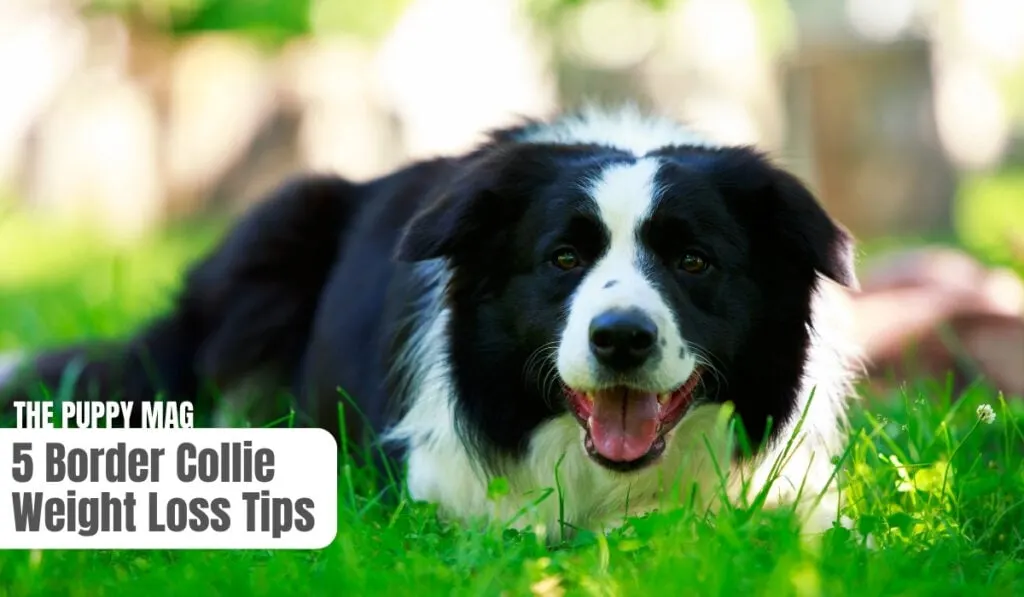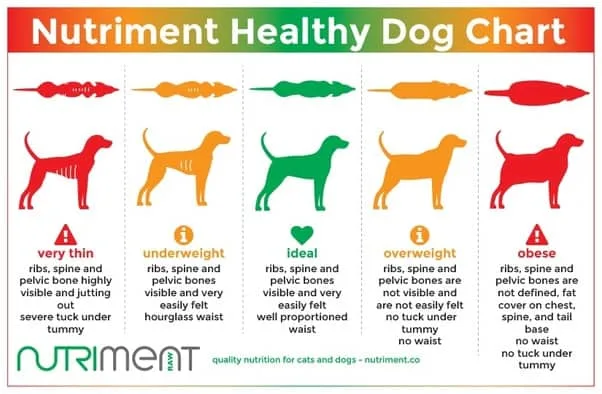If your Border Collie is overweight, it can negatively impact their health in the short and long term. And with obesity being more common in Border Collies than many other breeds, it’s a concern for many owners.
Over the years I’ve learned a few safe ways to effectively help a dog shed some pounds. This article runs through everything I know so you can do it correctly and safely.

Table of Contents
Is Your Border Collie Overweight?
Your Border Collie’s weight will naturally fluctuate depending on her age, so it helps to know what weight ranges are considered normal.
After all, you may be worrying more than you need to be!
● A healthy male adult Border Collie will range from 45lb to 65lb
● A healthy female adult Border Collie will range from 35lb to 55lb
As you can see, this is quite a wide range of “healthy” weights. And that’s where a lot of the confusion lays when discussing BC’s. When searching online, there are major discrepancies between reputable websites.
As a working dog who is typically fast, agile, and athletic, it’s better to be towards the lower end of the weight range spectrum discussed above. It’s been the case for many years now that lean dogs live a longer life than overweight dogs. Related: Why Is My Border Collie So Big?.
Take a look at the following chart to help you know if your Border Collie is the correct weight.

Why You Need To Manage Your Border Collie’s Weight
Border Collies are prone to obesity, and in fact, around 25% of Border Collies visiting veterinarians are overweight. Source.
The issue with being even just slightly overweight is that it has a snowball effect essentially making it easier and easier to gain excess weight as time goes on.
Being overweight can cause a wide range of health issues such as:
● Cancer
● Heart disease
● Respiratory disease
● Kidney disease
● High blood pressure
● Diabetes
● Osteoarthritis
● Lower quality of life
And the list continues…
Border Collies are hard-working herding dogs, that are supposed to rival some of the fittest dog breeds we know of. Being overweight is something this breed is not ready to deal with.
Border Collie Articles:
Can Border Collies Tolerate Cold Weather?
Can You Leave a Border Collie Home Alone?
5 Ways To Help Border Collie Lose Weight
Let’s run through the 5 ways you can help your Border Collie lose weight and become healthier, fitter, and improve their longevity.
- Cut out table scraps
- Reevaluate portion sizes
- Increase daily exercise
- Switch to low-calorie treats
- Increase general activity levels
Rule Out Health Conditions First
Before trying any of the following tips. It’s very important to rule out actual health conditions first.
It’s no good trying random tips and tricks if the cause of your Border Collie’s weight gain is an underlying health issue that needs veterinarian attention.
Ruling out health issues with your local veterinarian is the sensible thing to do first to ensure you aren’t wasting time and risking your Border Collie’s health and safety.
1. Cut Out Tidbits & Table Scraps
Who doesn’t give their dog tidbits? Yep, pretty much everyone does, and while it’s ok for some, it’s not ok for all…(that sounds confusing)
Anyway, cut the tidbits and you’ll significantly reduce the calories your Border Collie gets on a daily, weekly, and monthly basis.
It’s all about calories consumed vs calories burned. The fundamental principle of weight loss is to consume fewer calories than what you burn and it’s the same for dogs.
The issue with human food, apart from the fact it’s made for us and not dogs, is that it often contains a lot of calories, and that adds up quickly. Whether it’s half a pork sausage or licking the gravy off the plate, it adds up fast and should be avoided.
2. Reevaluate her food cup sizes
You need to be careful with this one, and our advice is NOT to randomly reduce her portion size all of a sudden.
You must first check the food you are using, and take a look at the calories per cup for that food, and think about how many portions you are giving your Collie.
It may turn out that you’ve been giving her too much food each mealtime without realizing it. Cup sizes are important and you should first make sure you’ve been following the guidelines.
After checking the food packaging to get a rough idea of the recommended portion, you can make a small adjustment to the portion size you are regularly giving.
This may be exactly what’s needed…
It’s important to point out just how much dog food varies! Premium dog foods often contain higher protein and fat. Meaning a higher calorie content for the same portion size when comparing to a different brand (usually lower quality).
3. Increase Daily Exercise
An adult Border Collie that is otherwise healthy, should be receiving around 1-2 hours of exercise per day.
If your current exercise routine consists of 1 hour per day, try adding an additional 10-15 minutes to your normal routine.
It’s important to increase it only slightly, to avoid sudden strain or injuries.
The extra exercise will result in more calories being burned, which will then hopefully exceed the calories that she consumes. Subsequently leading to gradual weight loss.
This tip is only recommended for adult border collies (1.5 years old to 7 years old) BC’s too young or too old should stick to alternative exercise routines to avoid injury.
4. Switch To Low-Calorie Treats
Dog treats are an important part of any dog’s day.
They are used to training, for distracting your Collie while other dogs run past in the play park, and for letting her know she’s the best girl in the world, right!
The good news is that I’m not about to suggest stopping treats. Nope, but you do need to switch them for low-calorie treats, and if you can, limit how many you give.
Common dog treats like pig ears, certain chews, and bones can contain upwards of 150 calories per treat. That’s A LOT! especially on top of the calories she consumes from her food.
Zukes Minis Naturals Dog Treats are now your best friend. Each treat is less than 3.5 calories! So it’s much easier to reward your Collie without adding too many calories into her diet.
But of course, limiting treat consumption, in general, is advised.
5. Increase Overall Activity
Increasing your Collie’s overall physical activity will count toward more calories getting burned.
Try adding in an extra 20-minute play session throughout the day.
Tug of war, catch, fetch, hide and seek… It doesn’t really matter what you choose, they will all help keep your Collie’s heart rate up, metabolism firing and the calories burning!
Not to mention, extra playtime sessions will be great to reduce boredom, stress, anxiety, and will act as a great bonding session for you and your collie.
Final Thoughts
So there you have it, you now know how you can identify obesity in your Border Collie, and what you can do about it.
Please remember, that it’s always advised to rule out health conditions first, so speaking to your veterinarian is recommended.
View all Border Collie articles >>
